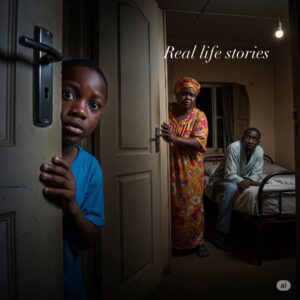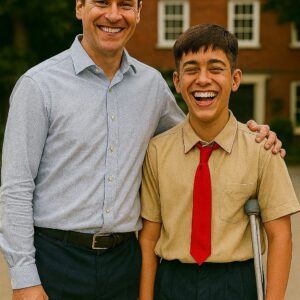MY MOTHER-IN-LAW STOLE MY BABY IN THE HOSPITAL AND TOLD ME HE DIED
The cries of babies echoed down the corridor, but mine… mine never came. I lay on the stiff hospital bed, drenched in sweat, eyes heavy from labor, lips dry from thirst. My arms reached out, trembling, searching—for the weight of my newborn. But there was nothing. No warm bundle. No nurse’s congratulations. Just silence, broken only by the sudden sound of my mother-in-law whispering something to a nurse before stepping into the hallway.
I was too weak to understand.
Too dazed from the hours of pain and blood to process the news that came moments later—“We’re sorry, your baby didn’t make it.”
My world collapsed in that second. My heart cracked in places I didn’t know existed. I screamed. I begged. I prayed. But all they gave me was a tightly wrapped, empty blanket, and a pitying look I would never forget.
My husband, Chuka, arrived thirty minutes later. He collapsed into my arms, sobbing. But his mother? She stood by the door with folded arms and dry eyes. No sadness. No grief. Only calmness. Unnatural calmness.
“I told you not to stress yourself during pregnancy,” she said coldly. “Now look…”
I wanted to scream at her. But my voice was gone. My pain was louder than my words.
They buried “my baby” the next day. I wasn’t allowed to see him. Not even his face. They said it was better that way. That it would help me move on. But nothing helped. Nothing made sense.
For weeks, I was just a ghost in my own home—sitting by the window, staring into nothingness. The baby clothes I had folded with love remained untouched. The cot we had bought still stood in the corner of our bedroom, mocking me.
My mother begged me to come stay with her, but my husband refused. “We need to grieve together,” he said. But grief never united us—it only widened the silence between us.
And then one day… everything changed.
It was at the pharmacy. I went to get pain relievers for my persistent headaches. As I waited in line, I heard the soft cry of a baby behind me. I turned—and my heart skipped.
The baby in the young nurse’s arms looked just like Chuka.
No—exactly like him.
Same ears. Same dark lashes. Same mark on the left cheek.
I stared too long. The nurse got uncomfortable. “Ma, can I help you?”
I didn’t speak. I just kept looking—because in that moment, a spark of something wild and terrifying ignited in my soul.
I followed her out of the pharmacy that day. Watched her enter a taxi and take the baby into a house I didn’t recognize. But I wrote down the address.
That night, when Chuka returned home, I tried to ask questions. But he got defensive. “Don’t start again,” he snapped. “The baby is gone. We need to move on.”
But I couldn’t.
Because in my heart, I felt something pulling. Screaming.
He’s not dead.
And the person who knew the truth… the one who had the most access that night… was my mother-in-law.
The same woman who had always called me “too soft” to raise a strong Igbo son. The same woman who said her son needed “a better womb.” The same woman who walked into my hospital room first—and came out last.
From that moment, I knew one thing.
I would find the truth.
Even if it destroyed everything.
The following morning, I wore a scarf over my head, left the house without a word, and walked until my legs ached. I arrived at the building where I had seen the nurse carry the baby the day before. It was a modest compound with a wooden gate and a cracked cement floor. My heart pounded as I stood at the gate pretending to make a phone call. I watched. Waited. An hour passed before the door opened.
She came out again—the same nurse. But this time, she wasn’t in uniform. She looked relaxed, holding the baby and laughing with a neighbor who called the child “Chibundu.” The name hit me like a stone in the chest. That was one of the names Chuka and I had shortlisted for our baby.
I pulled my phone from my pocket and began recording. Her face. The baby. The compound. Every detail.
I returned home dazed. I didn’t eat. I didn’t speak. But something inside me had reawakened—an ache sharper than grief. Hope. And hope, when stirred, refuses to sleep.
I started my own investigation. I remembered the name tag on the nurse’s gown when I first saw her: “A. Nwokolo.” It took only a few discreet inquiries to find out that she worked at the same hospital where I delivered. But she had gone on “maternity leave” shortly after my supposed stillbirth.
Maternity leave.
For a nurse who wasn’t pregnant during my stay.
I gathered more evidence. I printed screenshots of the baby. I compared his ears, his mole, his features with Chuka’s childhood pictures. The resemblance was no longer a coincidence. It was confirmation.
I confronted my husband that night, spreading everything on the table like a detective in a thriller movie. He looked at the pictures. He froze.
“Where did you get all this?” he asked, voice low.
“Answer me first,” I said. “Is my baby alive?”
He stood up, restless, confused, scratching his head. “I don’t know what you’re talking about.”
“You don’t know?” I hissed. “You don’t know your own son’s face?”
He slammed the table. “Leave it alone, Ifeoma! You’re just making things worse!”
“But I’m right, aren’t I?” My voice cracked. “Your mother did this. You knew!”
He didn’t respond. He just walked out of the room. And that silence told me everything I needed to know.
The next day, I went to my church. I cried at the altar. I told the pastor everything. I didn’t know what else to do. He listened, then said something I’ll never forget:
“When truth wants to rise, no lie can bury it.”
That evening, I returned to the hospital with a lawyer and demanded to see my delivery records. The head nurse stalled. But the lawyer insisted. When they finally brought out the file, parts of it were missing. Pages torn. Details crossed out.
It was a cover-up.
And it confirmed my fear: someone paid to erase my child’s existence.
I left that day determined to blow the truth wide open.
But what I didn’t expect was who would show up at my doorstep that night—
The nurse.
She came trembling, eyes red from tears. She clutched the child in her arms and whispered, “I’m sorry… I didn’t know. I was just asked to care for him temporarily. I didn’t know he was stolen.”
My chest tightened.
“You mean he’s really mine?” I cried.
She nodded. “Your mother-in-law paid me to keep quiet. She told me you died after delivery and your husband couldn’t handle the child. But after what I saw… I knew I had to come.”
I reached out, touched my baby’s face for the first time, and collapsed to my knees.
My son… was alive.
And now, it was time to make everyone pay.
I held him in my arms—my son. My flesh. My blood. The same baby they told me had died. His tiny hands gripped my scarf. His breathing matched mine, as if his spirit had been waiting for this moment just like mine had. I wept—not the weak tears of grief, but the fierce kind that rise from a mother who has seen death and still found her child alive on the other side. The nurse, Amaka, sat quietly in the corner, guilt weighing on her like chains. But even in her betrayal, I saw humanity. She could have kept quiet. She could have vanished. But she chose to come clean. And for that, I didn’t scream at her. I didn’t curse her. I simply nodded and whispered, “Thank you… for bringing him home.”
I named him Chizurum—“God sent me peace.”
That same night, I called Chuka and told him to come home. I didn’t mention the baby. I didn’t mention the nurse. I wanted to see if guilt had grown roots in his conscience. When he arrived, sweating and unsure, I opened the door with Chizurum in my arms. His mouth fell open. He didn’t ask questions. He didn’t speak. He just stood there, shaking his head like a man who had finally been exposed.
“You knew,” I said. “All this while.”
He knelt down, burying his face in his palms. “Ifeoma… I’m sorry. I swear, I didn’t plan it. I was scared. She—my mother—she told me you’d gone mad after the birth, that you imagined the baby crying even though he had already died. I believed her. I was wrong.”
“No,” I said, “you didn’t just believe her. You obeyed her. You let her bury me with lies. You let me mourn a baby who was never dead. You left me alone in that darkness.”
We didn’t argue. We didn’t fight. He knew there were no words to heal what he allowed. I told him to leave. That night, I packed my things. I left the house with my son and moved in with my aunt across town. And that’s when the battle began.
My mother-in-law—yes, the same woman who swore I was cursed, the same one who said I was unfit to be a mother—showed up at the hospital with her connections. She tried to frame the nurse, saying Amaka had stolen the baby and faked records. She brought lawyers. She even went on live radio to say I was mentally unstable and obsessed with a child that wasn’t mine.
But I came with evidence.
The missing hospital pages. The CCTV clip of her entering the ward late at night with a nurse who had been fired the next day. The testimony of Amaka, who risked everything to confess under oath. And then—the paternity test.
The court ordered it. And when the results returned, 99.99% match to Chuka.
That was the final blow.
My baby. My Chizurum. My truth.
The judge ruled in my favor, not only granting me full custody but also ordering a restraining order against my mother-in-law and opening a criminal investigation into the entire conspiracy. Her reputation? Ruined. Her pride? Shattered. Her control? Gone.
Weeks passed.
I returned to my job, holding my son close every day, watching him grow into a boy full of light, laughter, and resilience. People whispered about the case, about the “miracle baby” who returned from the grave. I didn’t mind. I knew my story wasn’t just mine—it was a message to every mother who had been silenced, every woman who had been doubted, every wife who had been buried alive under lies.
As for Chuka… he begged for another chance.
But I had learned something powerful:
When a man can’t stand up for you against his mother, he’ll never stand beside you in the fire.
I raised my son alone. Proud. Bold. Strong.
And every time I kissed his forehead, I reminded myself—
They tried to steal my child, but they couldn’t steal my destiny.
Because I was never just a mother.
I was a warrior.
THE END.





